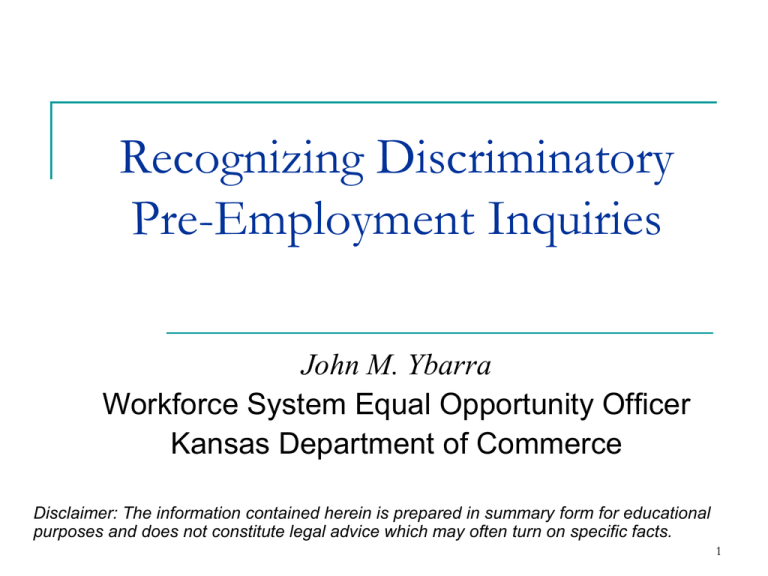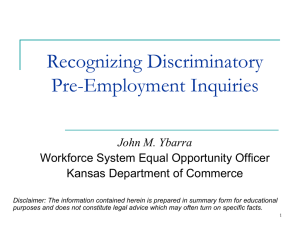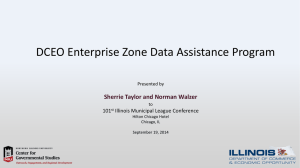
Recognizing Discriminatory
Pre-Employment Inquiries
John M. Ybarra
Workforce System Equal Opportunity Officer
Kansas Department of Commerce
Disclaimer: The information contained herein is prepared in summary form for educational
purposes and does not constitute legal advice which may often turn on specific facts.
1
What is a Pre-Employment Inquiry?
Employment Interview Questions
Employment Application Questions
Job Advertisement Language
Recruitment Brochure Language, etc.
2
Federal Anti-Discrimination Laws
Title VII of the Civil Rights Act of 1964
prohibits employment discrimination based on
race, color, religion, sex and national origin.
The Americans with Disabilities Act prohibits
discrimination against qualified individuals
with disabilities.
The Age Discrimination in Employment Act
protects individuals 40 years of age or older.
The Equal Pay Act protects men and women
who perform substantially equal work in the
same establishment from sex-based wage
discrimination.
3
What is Employment Discrimination?
Employment discrimination occurs when
job applicants and employees are treated
unfairly based on their race, color,
ethnicity, gender, sex, national origin,
religion, age, disability, or genetics.
Each of these categories is known as a
“protected group” or “protected
status.”
4
Disparate Treatment Discrimination
Intentionally treating applicants or employees from a
protected group differently than others.
Examples:
Evaluating responses by black applicants
differently than white applicants.
Testing female applicants differently than male
applicants.
Asking job applicants about their past or current
medical conditions, or requiring certain job
applicants to take medical exams.
5
Disparate Treatment
Illegally Screening Applicants
A company executive contacts an employment
agency to hire a new administrative assistant
saying she wants to interview candidates with
excellent clerical skills who relate well with high
level executives. The agency searches the resume
database which produces 50 qualified candidates.
To reduce this to a more manageable number the
agency refines the search to eliminate candidates
living in mostly Black or Latino zip codes.
This is Disparate Treatment and violates title VII of
the Civil Rights Act.
6
Adverse Impact Discrimination
Neutral employment practices that unintentionally
discriminate against a protected group.
Examples:
Height and weight requirements
Educational requirements
Physical agility tests
How is this discriminatory though?
7
Adverse Impact Occurs…
When height and weight requirements
unrelated to job performance exclude
women and persons with disabilities.
When employers require an educational
level that does not match the job duties
and it negatively impacts persons of color.
When physical agility tests unrelated to job
performance exclude women and persons
with disabilities.
8
Valid Business Necessity
Defense to Discrimination
A valid business necessity is a job requirement
that excludes a particular group but is
necessary for safe and efficient job
performance.
“Job Related and Consistent with Business Necessity”
Examples:
Height requirements for pilots
Age requirement for FBI agents
Commercial pilots must have 500 flight hours
and a college degree
9
Bona Fide Occupational Qualification
Defense to Discrimination
A job requirement that can only be met by applicants
of a certain sex, religion, age or national origin.
Examples:
A French Restaurant hires only French Chefs.
Only males can work as a men’s room attendant.
Employees must be 21 years old to serve alcohol.
Applicant must be of a certain religion to be a
clergy member.
*Race and Color can never be a BFOQ.
10
Discriminatory Practices
Yielding to Customer Racial Preference
ACME Home Care hires personal aides to provide
in-home assistance to elderly persons. ACME
has mostly white clients who have exclusively
requested white aides. Gladys, an experienced
African-American aide applies with ACME
because it offers better pay. ACME wants to hire
Gladys but decides not to because it believes its
clients would not be comfortable with an African
American aide.
The employer has violated Title VII because customer racial preference
is not a BFOQ.
11
Job Title Language
Inadvisable
Acceptable
Barmaid…………………………………… Server, Cocktail Server
Bus Boy, Tray Girl……………………….. Busser, Cafeteria Worker
Cleaning Woman………………………….Cleaning Assistant, Room
Attendant
Draftsman…………………………………. Drafter, Auto CAD Specialist
Fireman…………………………………….Fire Fighter
Fisherman………………………………….Fisher
Foreman…………………………………... Supervisor
Handyman………………………………… Miscellaneous Repairer
Journeyman *……………………………...Journey Level
Leadman…………………………………...Crew, Shift or Team Leader
Longshoreman…………………………….Longshore Worker
12
Job Title Language
Inadvisable
Acceptable
Maid……………………………………….. Housekeeper
Maintenance Man…………………………Maintenance Worker
Policeman………………………………… Police Officer
Repairman…………………………………Repairer, Technician
Salesman, Saleswoman………………… Sales Representative, Sales
Clerk, Sales Consultant
Stewardess, Steward……………………. Flight Attendant, Cabin
Attendant
Waiter, Waitress………………………….. Server
Other Non-Discriminatory Options: Sex specific titles such as
Guardsman, Horseman, Midwife, etc. may be used if accompanied
by the designation “man or woman” or “male or female”.
13
Job Advertisement Language
Inadvisable
Acceptable
Man, woman, girl, boy, lady…………….. Person, applicant, candidate,
trainee, incumbent, staff, employee
Married, Single…………………………… No acceptable substitute
Cute, handsome, pretty,
clean cut, attractive…….......................... Professional appearance, Employer
has dress code
Non-smokers only…………………………Non-smoking environment
No criminal record,…………………………Employer does background check
No felonies
Recent graduate, college student……….College degree required, Internship
Mother, housewife……………………….. Part time, short hours
Young, energetic…………………………. Entry level, trainee, intern
14
Job Advertisement Language
Inadvisable
Acceptable
Black, White, Minority
Colored, Oriental, Asian, Mexican…………….Applicant, candidate, incumbent
Must own a car………………………………….Must be able to arrive at work on time
Must be male, physically fit……………………Able to lift 50 lbs.
Handicapped, crippled, retarded…………….. Person/People/Individual with
disabilities, accessible
entrance/bathroom, etc.
Must have # years experience………………...Successful, wide ranging,
considerable experience
Junior…………………………………………… Entry level
Senior…………………………………………… Mature attitude, approach,
or understanding
No unemployed candidates considered…….. Not acceptable
Additional Acceptable Terms: Reliable, responsible, efficient, minimum wages,
long hours, overtime, able to travel, willing to relocate, wide-ranging, considerable
experience.
15
Age Inquiries
Inadvisable Language
“Energetic” “High School” “Young, strong, dynamic”
“Youthful appearance”
“Persons over 50, 60, 70, etc. need not apply”
“Family Oriented”
“Maximum experience requirement of X number of
years”
“Expected experience range of X to X number of
years”
16
Age Inquiries
Chris, a 65 year old man, saw a newspaper ad
for a cashier at Groceries R Us. The
advertisement states:
“Applicant must be young and energetic and
possess excellent customer relations skills.
Applicants who are selected would be
required to stand for long periods of time and
lift 20-30 pounds.”
17
Age Inquiries
Chris contacted the EEOC who determined the ad to
be discriminatory. By using the word “young” the
ad indicates a specific preference based on age
which would deter many qualified older persons
from applying.
Deleting the word “young” would probably make
the ad acceptable as persons of all ages can be
energetic and possess excellent customer service
skills.
The requirements to stand for long periods and to lift
20-30 pounds are not age related and appear to be
consistent with business necessity.
18
Sex/Gender Inquiries
Inadvisable Language
“Only men/women wanted”
“Seeking waitress” (should say server, wait
staff, etc.)
Job Advertisements must not express a sex
preference unless sex is a bona fide
occupational qualification for the job.
19
Language/National Origin Inquiries
Inadvisable Inquiries
“English speaking applicants only”
“Is English your first language?”
Requiring the ability to read, write, or speak
English, unless it substantially relates to job
duties, can be discriminatory.
The language level sought should not exceed
the level needed to perform the job. The EEOC
presumes that English-only policies that apply
at all times violate Title VII of the Civil Rights
Act.
20
English-Only Policies
An English-only rule may be used if necessary to
promote safe and efficient business operation
such as in the following situations:
Communications with customers, co-workers, or
supervisors who speak only English.
Emergency situations and cooperative work
assignments which require a common language
to promote safety and efficiency.
English only policies should apply only to
specific workplace situations. Employees
should generally be allowed to speak other
languages during breaks, meals, etc.
21
Health/Disability Inquiries
Inadvisable Language
“Must not have a disability”
“Must not be predisposed to a disease or illness”
“Have you undergone a psychiatric evaluation?”
“Do you have any disabilities?”
“How much alcohol do you drink each week?”
“Have you ever filed for workers compensation?”
Employers may not ask applicants if they have a
disability or require them to take a medical exam
prior to extending a job offer.
22
Health/Disability Inquiries
Employers may ask the following questions to
determine whether an applicant can perform
specific job functions. These questions should be
asked of every applicant.
Can you meet the essential functions of this job
with or without reasonable accommodation?
Describe how you would perform this job with or
without reasonable accommodation.
Can you meet the attendance requirements of this
job?
23
Discriminating Against the Unemployed
Inadvisable Language
“Must be currently employed”
“Only currently employed candidates will be
considered”
Using current employment as a selection
criteria could adversely impact women,
minorities, and individuals with disabilities.
24
Arrest Record Inquiries
Inadvisable Language
“Have you ever been arrested?”
“How many times have you been arrested?”
“Must have no arrest record”
There is no law that prohibits employers from
inquiring about arrest and conviction records.
However, the EEOC has determined that
using such records as an absolute bar to
employment has an adverse impact on
some racial and ethnic groups.
25
Arrest Record Inquiries
Since an arrest alone does not necessarily mean
that an applicant has committed a crime, the
employer should not assume the applicant
committed the offense.
The employer should allow the applicant to explain
the circumstances of the arrest(s) and make a
reasonable effort to determine whether the
explanation is reliable.
The EEOC states that where it appears the
applicant engaged in the conduct for which he/she
was arrested, and that conduct is job-related and
relatively recent, exclusion is justified.
26
Conviction Record Inquiries
Convictions that occurred within a reasonable
amount of time prior to the application may be
inquired about and considered if the employer
can show that the conviction is directly related
to the position.
Employers should consider these questions:
Did the applicant actually commit the offense?
What is the nature and gravity of the offense?
How long ago was the offense?
What is the nature of the job being applied for?
27
Arrest/Conviction Records
Inadvisable Language
“No felonies”
“No felonies or violent misdemeanors”
“Must have clean criminal history”
Acceptable Language
“Must be able to pass a criminal background
check”
“A conviction record will not necessarily be a
bar for employment”
28
Drivers License Inquiries
Inadvisable Language
“Must have a drivers license”
Asking for a driver’s license when the job duties
don’t involve driving can be discriminatory.
How someone gets to work is not a job related
requirement because people can get to work using a
variety of methods.
Arbitrarily excluding applicants without a driver’s
license may have an adverse impact on persons
with disabilities and persons of color.
29
Car Ownership Inquiries
Inadvisable Language
“Must own a car”
Requiring applicants to own a vehicle, unless the job
requires use of the vehicle, can be discriminatory.
Car ownership is not a valid test for the candidate’s
reliability or ability to get to the work site.
Arbitrarily requiring a vehicle may have an adverse
impact on persons with disabilities and/or some
persons of color who statistically have lower
incomes and may use other transportation.
30
Military Service Inquiries
Inadvisable Language
“Must have been honorably discharged from the
military.”
The EEOC recommends that employers not have a
policy of rejecting applicants with less than an
honorable military discharge.
If employers inquire about military discharge they
should include a statement such as:
“Dishonorable discharge is not an absolute bar to
employment and other factors will affect the final
hiring decision.”
31
Scams/Fraud
Questionable Language
“Fund transfer agent” “package forwarding”
“Wiring funds”
“Guaranteed job” “Immediate Hire”
“Multi-Level Marketing” “Sports Marketing”
“Must buy products” “Must pay fee to
apply/qualify” “Send check or money order”
Salary listed in foreign currency
Contact email is @gmail.com or
@yahoo.com or from a foreign country
32
Equal Employment Opportunity
Employers should state on applications that they are
an “equal opportunity employer” and that all
qualified applicants are encouraged to apply,
regardless of race, color, religion, national origin,
ancestry, sex, disability, age, or genetics.
ACME Inc. is an equal opportunity employer which
does not discriminate on the basis of race,
national origin, religion, age, color, sex,
disability, veteran’s status, genetics, or any other
characteristic protected by local, state or federal
laws, rules, or regulations.
33
Affirmative Action Statements
ACME Inc. maintains an affirmative action plan
through which it makes good faith efforts to
recruit, hire and advance in employment
qualified minorities, females, disabled
individuals and Vietnam era and special
disabled veterans.
Affirmative Action Employer: Females and
minorities are encouraged to apply.
34
Rules of Thumb
“Describe the job, not the person”
“If it’s not job related-don’t ask”
35
Resources
U.S. Equal Employment Opportunity Commission
1-800-669-4000
www.eeoc.gov
Kansas Human Rights Commission
785-296-3206
www.khrc.net
U.S. Department of Justice Civil Rights Division
Worker Hotline: 1-800-255-7688 • Employer Hotline: 1-800-255-8155
http://www.justice.gov/crt/
John M. Ybarra
Workforce Center Programs Equal Opportunity Officer
785-296-5092
jybarra@kansascommerce.com
http://wco.kansascommerce.com/eo/Pages/default.aspx
36





